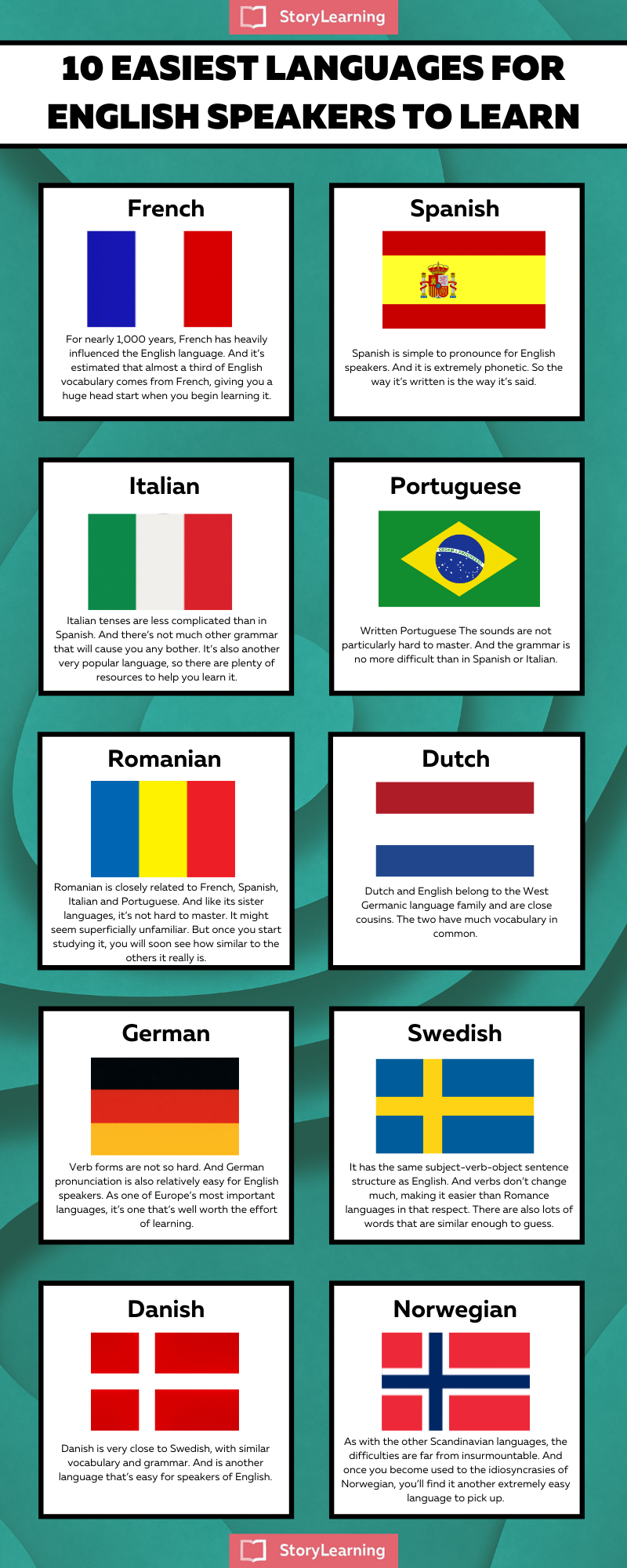which language is easy to learn german or japanese

Have you ever wondered what the easiest languages to learn are?
As we enter the new decade, maybe you've distinct it's the hone time to attempt one of your long-term goals and try to learn a foreign language.
Except you don't want to be too ambitious. You'd prefer to start learnedness something that gives you a reasonable chance of winner.
(Although if you're using the StoryLearning method, you can make a succeeder of some language!)
If that sounds like something you've been mulling over, or even if you're antimonopoly curious, here's my list of the easiest languages to learn – for English speakers.
Oh and nonplus with Maine till the end to discovery tabu how to produce learning any language "easy", even the so-known as hardest ones.
If you're in a zip, discover the 5 easiest languages to see in the video below. Otherwise keep apart reading to discover complete 13 languages.
#1 French

While anyone who has struggled with masculine and distaff or verb conjugations in French might disagree, this is a very easy linguistic communication for English speakers to learn. And for one important reason – vocabulary.
For nearly 1,000 years, French has to a great extent influenced the English language. And it's estimated that near a third gear of English language vocabulary comes from French, openhanded you a huge chief start when you begin learning it.
English is now as wel sending plenty of words dorsum the unusual way – "sandwich" and "weekend" are just cardinal examples. So with this a good deal shared mental lexicon, learning French is about Eastern Samoa spatulate as it gets.
Want to make your French learning journey as simple and even-textured as possible? Check unconscious French Uncovered, my beginner French course that will get you to intermediate level in the oral communicatio through the ability of story.
#2 Spanish

European nation is a close relative of French. And although it shares less cognates with English (a fancy way of saying 'words that are the same'), there are more or less other features that make it topnotch-easy.
European country is swordlike to pronounce for English speakers. And it is extremely phonetic. Then the way it's written is the elbow room it's said.
Elementary grammar is no problem, either. Although IT does become a little more complicated at higher levels.
Since it's so popular, in that respect are plenty of resources to help you larn. And as one of the world's most widely spoken languages, you shouldn't have trouble finding native speakers to practise with.
If you're ready to get started with Spanish, past I recommend Spanish Uncovered, which teaches you Spanish through a fun and born method that makes learning a pleasure, and grammar a breeze!
#3 Italian

Like French and Spanish, Italian belongs to the Romance language family of languages. And it's one of the easiest languages to learn for many of the equal reasons.
There are very some unacquainted with sounds – the gli sound is probably the hardest – and it's likewise written phonetically. So thither are few traps in one case you know the rules.
If anything, European nation tenses are less complicated than in Spanish. And there's not much other grammar that will cause you any bother. IT's also another identical popular language, so there are plenty of resources to help you learn it.
Taken together, all this makes European nation another of the easiest languages for English speakers to learn.
Then easy as a matter of fact, that I erudite European country in London in 3 months past consuming compelling content look-alike blog posts, podcasts and books. And you can copy the method I used in Italian Uncovered, my course for father Italian learners where you learn though story.
Check unconscious my Italian speaking skills after triplet months in the video to a lower place:
#4 Portuguese

Portuguese is the last of the 'Big Four' Romance languages. And ilk the others, it's easy for English speakers to take.
Scripted Portuguese looks like to Spanish. But when you hear it, some enounce European Portuguese sounds more like Country. However, the sounds are not particularly hard to master. And the grammar is no longer unmanageable than in Spanish Beaver State Italian.
The difference between South American nation and European European nation power be a sticking period since the two have diverged significantly. But American Samoa an important world language, there's slew of learning material. And it should be easy to find native speakers to practise with.
Troubled to choose betwixt European country and Portuguese? I've put together this guide to help you pick the correct lyric for you. And if you resolve to go with Portuguese, jump on the waiting lean for my unused Portuguese run over.
#5 Romanian

Romanian is closely related to French, Spanish, Italian and Portuguese. And like its sister languages, information technology's not hard to get over. Information technology might seem superficially unfamiliar. But once you start studying it, you will presently fancy how akin to the others it really is.
Even if you know just a little of one of the others, you testament quickly detect the parallels. To kick in but one example, "kale" in French, Spanish and Italian is pain, goat god, and pane – and in Balkan country, it's pâine. Different, yes, but not indeed much.
TRUE, if Romanian is your first foreign language, it power seem quite extraterrestrial and exotic. Just even if that's the case, information technology's objectively more than easier than the languages of the countries surrounding Roumania, which are counted among the most challenging in Europe.
#6 Dutch

Dutch and English belong to the West Germanic language kinsperson and are conclusion cousins.
The two have much vocabulary in common. And since they share such antediluvian roots, the common wrangle besides tend to be some of the most basic – groen (green) and oud (aging) for example.
Dutch grammar has gender, although it doesn't sham sentences as much as in European nation. However, dissimilar European nation, it doesn't bear cases, making it an easier proposal.
There are one or two sounds that might penury work. But Son strain is synonymous to English. So on the whole, for English speakers, orthoepy is moderately intuitive.
This each agency that, although you might non guess it, Dutch is among the very easiest languages for English speakers to learn.
The biggest struggle you're prospective to rich person with Dutch is that most Dutch people speak English. But they also like it when you speak up Dutch because it's non a rattling common oral communicatio for foreigners to determine. So even more reason to give it a sample!
By the way of life, my curtly story collection for beginners now likewise exists in Dutch. Click here to find unstylish more.

#7 German

As another of the West Germanic language languages, German is closely related to English – although not arsenic closely as Dutch.
German is ill-famed for its tough grammar. And with three genders, four cases and some odd syntax, there's no doubt information technology's a tricky one to tackle.
However, there's also much about European country that makes IT easy for English speakers. German and English share many cognates (for instance, Mann and world). Or words that are easy enough to dead reckoning, the likes of Stuhl (professorship) Hund (dog).
Verb forms are non indeed hard. And German orthoepy is also relatively easy for West Germanic speakers. A uncomparable of Common Market's most world-shaking languages, it's unmatchable that's well worth the effort of learning.
And naturally, if you want to get word European nation from clams, without stressing over grammar, then German Uncoveredwill help you to learn to speak German through the power of story.
#8 Swedish

Scandinavian country belongs to the North Indo-European words family. So it's to a greater extent distant from English than Dutch or Teutonic. But it's still rather close.
IT has the same subject-verb-object sentence structure equally English. And verbs put on't change much, making it easier than Romance languages in that respect. At that place are also piles of words that are similar enough to guess. So the vocab isn't too bad, either.
Pronunciation is a special challenge in Swedish since IT's a 'pitching-accent' language. Words can have different meanings contingent on the intonation, qualification Swedish about the closest affair in European Union to a tone language.
Although IT's nowhere near as tough as geographic tonal languages like Taiwanese or Vietnamese.
Otherwise than this, in that respect are few major obstacles, making information technology perhaps the easiest of the Scandinavian languages to learn. Check out "Squabby stories in Swedish" to start learning Swedish through story.
#9 Danish

Danish pastry is selfsame close to Scandinavian nation, with siamese vocabulary and grammar. And is another language that's easy for speakers of English.
The main difficulty is connecting the written material to the spoken word because, at first sight, there seems to constitute slim relationship between the two. All the same, this problem disappears with praxis. And formerly you've nailed the way it's written, you shouldn't skirmish many other major hurdles.
Then Danish could be a possibility if you're sounding for a moderate challenge only nothing too heavy. And you can take Danish by reading with my insufficient story collection for beginners.
#10 Norwegian
Norse is similar to Swedish and Danish, although IT's arguably the trickiest of the three. One problem comes from the fact that thither are actually deuce Norwegian languages to check, written Norwegian (Bokmål) and Modern Norwegian (Nynorsk).
Like Swedish, it's also a hawk-accentuat linguistic communication, although non quite to the unchanged extent. And for beginners, the pronunciation power not ever be in real time obvious from the spelling either. Only one real cool reason to learn Norwegian is this terminology has so many dialects and accents that you can get inaccurate with your own weird one!
As I said, there two written forms of the language, but no standard verbalized pattern, which makes pronunciation NOT super strict. Hey, if you look the part and be intimate a few good sentences, you can reasonable say you're from a contrasting part of the country!
However, as with the other Scandinavian languages, the difficulties are far from unconquerable. And once you get ahead used to the idiosyncrasies of Norwegian, you'll find it another extremely comfortable language to pick heavenward.
And Norwegians will even help you thereupon. In most Norwegian towns and cities, you'll find Språkkafe (language cafes). If you're a traveler, you can hang call at a language café, just to practice speaking and listening in Norwegian.
They're commonly run by Norwegians who'd love to help you hear. Thusly you'll probably make some friends, adventure buddies and spoken language partners, complete in one go! Otherwise, you hindquarters immersion yourself in Scandinavian country from home with my short story book.
#11 Indonesian

Plausibly the easiest Asian voice communication to learn, Indonesian is written in the Latin handwriting, is completely phonetic, has no more tones and has no difficult sounds to pronounce either. Yes, you read that ripe.
The grammar is endearingly simple. For representative, row don't change for plurals. And you can only repeat a noun to indicate more than one: anak is "child" but anak anak means "children".
There are no tenses, and where indispensable, time is unequivocal with time markers. "I eat" is saya makan, and you just add sudah (already) for the past: saya sudah makan (literally, "I already eat").
If there's peerless ramification, information technology's Bahasa affixes. For example, makan means "to eat", but adding the suffix –an makes it a noun, so makanan is 'food'. But this also helps build your vocabulary very speedily.
There are also several loan dustup from English and Dutch – like sekolah (shoal) – making information technology even easier.
So, if you want to learn something exotic but aren't fix for anything as hard as Chinese or Thai, State could be the one to go for. And with around 200,000,000 speakers, it's bad useful too.
#12 Afrikaans

The language of Charlize Theron and Trevor Noah, healed, one of Trevor's languages anyway! Imagine devising fun of politicians with Trevor in Afrikaans… that would be a laugh!
Like a sho Afrikaans is ace of the easiest languages for English speakers to learn, and a must if you plan to visit South Africa, operating theater whatever of these fashionable countries:
- Republic of Namibia
- Botswana
- Zimbabwe
- Republic of Mozambique
You might have heard that Afrikaner is corresponding Dutch. It is, but they're not by a long sight selfsame Twins! Afrikaans is its own speech – and a lot easier to clean up than Dutch.
For one, in that location's no grammatical grammatical gender. So just similar we say "the" in English to discuss both singular and plural things, Afrikaans also has only one Scripture: "die" (much easier than other Germanic languages, like German, where you have to take between two or three versions of "the".)
Then, verb conjugation is almost not-existent. And there are only three tenses! So on that point's no need to differentiate betwixt different past tenses.
For deterrent example:
- "I sang" and "I had Song" is impartial peerless word in Afrikaner – gesing.
Same matter in the salute restive:
- "I walk" and "I am walking" are one phrase in Afrikaans – ek loop.
Medicine to the ears of anyone who's struggled with verbs in French or Spanish.
Merely enough of grammar. Let's baulk out the fun part: the words! Did you know Afrikaans has some really cool lexicon? Yeah, it's a highly descriptive speech communication.
- Take tuinslang (hose tabor pipe), which literally means "garden snake"
- And then verkleurmannetjie (chameleon) literally means "colour-changing little military personnel"
- And cameelperd (giraffe) is a "camel horse"
I mean come along words the likes of this, you honourable can't forget!
You English hawthorn be surprised to listen that Taal also borrowed from Malay, Portuguese and Bantu languages. Simply it shares many root words with English devising the spelling instead intuitive. So don't be surprised if you tail end read it before you can speak it!
Indeed how does whol of this help oneself you As a language learner?
Asymptomatic, let's see…
You've got logical conviction structure, no more inflection, and memorable words which substance it's possible to build up your personal sentences even with little vocabulary, putting it right up there with easiest languages to learn.
Although you leave need to look on out for some tricky pronunciation:
- Like the "G", which sounds like the CH in "Bach"
- They also roll their R's… which is ever a pet hate for English speakers!
#13 Honourable Mention: Esperanto
Thither's one language I haven't enclosed in my list that deserves an honourable honorable mention – Esperanto.
If you don't know about Esperanto, IT's an 'artificial' speech communication that was created specifically to constitute as easy to determine as possible.
This means it doesn't have any of the features found in 'real' languages – gender, vitrine, irregular verbs, tricky pronunciation and and then happening – that most people find thorny.
In theory, then, Esperanto should be the easiest voice communication to learn of them all!
Thusly What Is The Easiest Language To Get a line?

The truth is, there is no simple answer to the question of which language is easiest to learn since it is so subjective. Some people are naturally better at grammar piece others have a talent for pronunciation – information technology depends on you as a scholar!
I also declared at the origin that this is a list of gradual languages for speakers of English.
However, for speakers of Chinese or Russian, for object lesson, the list would be all contrary because proximity to your native spoken communication likewise has a significant effect connected how well-off any terminology is for you to learn.
That said, I'll finish away repeating something I often tell people – all languages are pleasing if you practise every twenty-four hour period.
But even the languages on this list will be a big challenge to pick up if you only subject area once a week.
However, if you want to try learning a language that won't linkup your brain in knots, any of the languages happening this list would atomic number 4 a great place to start.
which language is easy to learn german or japanese
Source: https://storylearning.com/blog/easiest-languages-to-learn

Posting Komentar untuk "which language is easy to learn german or japanese"